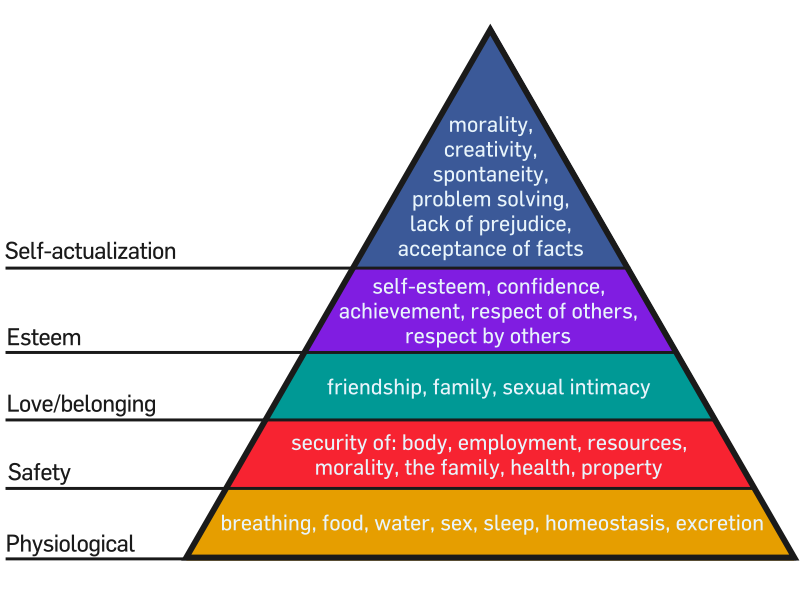Anyway, my husband doesn't seem at all divorce-worthy, so I'm not going to fret over it.
One thing I'm definitely getting sick of, though, is all this talk of reward and punishment. In Matthew 19:16-30, people are asking Jesus about how to reap the rewards of the afterlife. I have yet to see a single instance where anyone has discussed the intrinsic value of being a good person. It's always "Do as I say or you're going to hell!" or "Do as I say and you'll get a throne and treasure when you're dead!"
It makes me wonder how self-actualization fits into Christianity. The messages here all seem to be about punishment and reward, rather than encouraging followers to do what's right and good because it's right and good. I understand that an estimated 1% of adults reach self-actualization (see below), but I can't help but feel like these kinds of messages are a hindrance to that, training people their whole lives that good deeds will get you a higher rank and [probably figurative] treasure in the afterlife.
It bothers me.
 | |
| Maslow's Heirarchy of Needs |
In that same section, Jesus tells a guy to give away all his possessions to the poor, and then says, "Again I tell you, it is easier for a camel to go through the eye of a needle than for someone who is rich to enter the kingdom of God," (Matt 19:24). The problem is that "rich" is a subjective term. Comparing living situations across the world, I would venture to say that anyone who may read this is "rich," simply based on their having access to a computer.
Basically, a camel will have an easier time getting itself through the hole of a needle than I will getting into heaven, unless I give all of my things to the poor. And then all that other stuff Jesus told me to do will be moot anyway--one of the many problems with a religion that dictates its followers behavior with threats and promises.
Yes, I'm notably perturbed by chapter nineteen.
I'm not sure how I feel about the parable of the workers in the vineyard (Matt 20:1-16). Jesus has made it pretty clear that not everyone is equal in heaven--that some will earn a "greater" place than others--but this parable states the opposite. Basically, a vineyard owner picks up a bunch of guys and tells them he'll give them a denarius for working all day. Around noon, he picks up a few more guys, and then he picked up a few more at around five. When the vineyard owner paid everyone their denarius, the guys who got there in the morning were like "Hey! We worked all day and these guys only worked an hour! What gives??" The vineyard owner just says, "Pfft, I want to pay these guys the same as you. It's my money, so chillax." And Jesus says this is how heaven is--you get the same, even if you worked less, thanks to the generosity of God.
Except for all those times that Jesus said "Do these extra things and you'll get more rewards in heaven." And he promised his disciples thrones upon which to judge people.
A few verses later, Jesus is walking down the road when two blind men beg him for mercy. Jesus, being his charming self, rebukes them and tells them to be quiet (Matt 19:31). When they kept yelling, he stopped and said "What do you want me to do for you?" to which the blind guys replied "Well, being that we're blind... some sight would be nice." Okay, not those words, but come on, Jesus. He did heal them, though, and let's be honest... if I had people begging me for heals all the time, I would get snarky too. I can't even play a healer in an MMO--I always end up being all "Get some potions are something! Can't you see I'm trying to farm for gold over here?"

